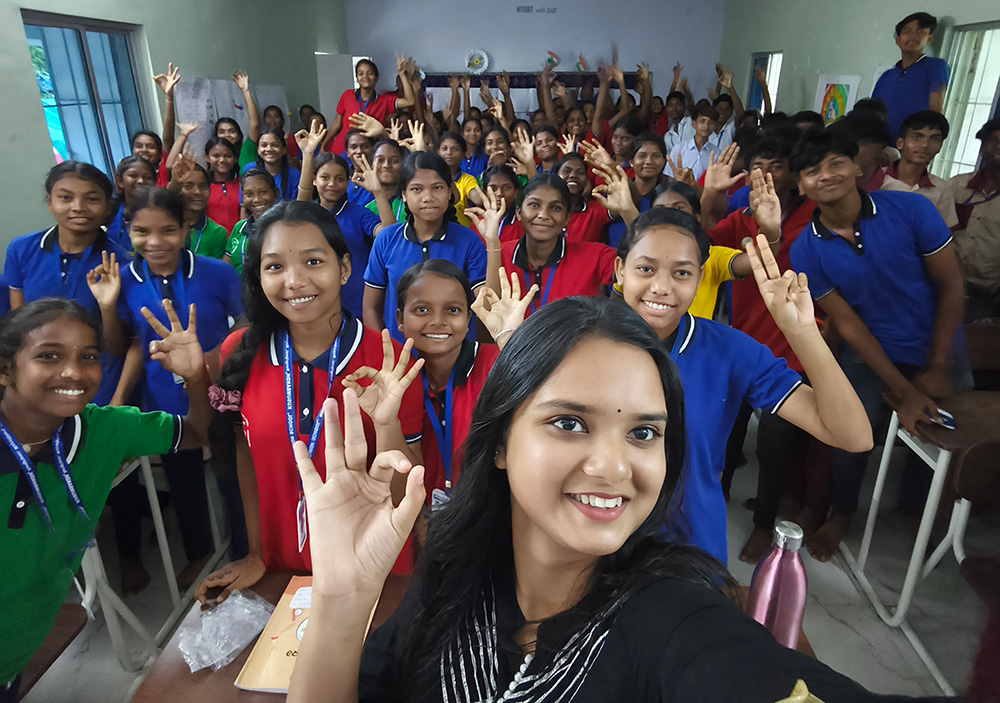
Menstrual health in India remains shrouded in silence, stigma, and misinformation. For many adolescent girls, periods are treated not as a normal biological process but as a source of shame: girls miss school, cannot access hygienic supplies or safe disposal, suffer preventable infections, and are excluded from public and family life because of taboos. The consequences are immediate (absenteeism, infections, poor hygiene) and long-term (lowered confidence, reduced school completion, limited access to health care), undermining girls’ physical, emotional and educational development.
Purvika’s act to break the whisper
Purvika’s commitment grew from the small but powerful moments of her childhood. At home, conversations about periods were whispered and rushed; her mother would hide pads in the back of a cupboard and tell her to “be careful” rather than explain why. Next door, a neighbour’s daughter regularly missed classes because the family had no sanitary materials; once she developed a severe infection and the family blamed her “bad luck” rather than lack of care. These household silences stayed with Purvika. When she became a Gandhi Fellow and started engaging with adolescents, she recognised the same hush, only now could she do something about it. She wanted to turn the whispers into knowledge, and knowledge into an agency.
Bangriposi’s local context that deepened the challenge
Bangriposi, in Mayurbhanj district, is a tribal-dominant block where close-knit communities hold strong cultural beliefs. In this context, menstruation is wrapped in layered taboos: rules about temple entry, kitchen duties, bathing, and sleeping arrangements are often stricter than in urban areas. Traditional healers, elders and kinship norms shape everyday behaviour, and discussions that challenge belief systems are met with caution. Limited access to health infrastructure, scarce sanitary product supply chains, and low prioritization of adolescent health by local institutions made the topic doubly difficult girls had little private space to ask questions, and adults lacked both training and confidence to address the subject.
Changing one school at a time
Purvika began where change felt possible: the school. She secured permission from principals and the Block Education Officer to run workshops on menstrual hygiene management and awareness. Her first sessions were intentionally simple and participatory; she asked girls to draw what “womanhood” and “periods” meant to them. Those drawings, full of confusion and shame, told her more than any survey could. From there she created safe spaces for learning: interactive lessons on the menstrual cycle, myth-busting conversations about impurity, and hands-on demonstrations of hygienic pad use and disposal.
Teachers attended alongside students, so learning didn’t end with her sessions; they left with classroom-ready activities and a plan to normalize discussion in regular health education. Purvika also supported the formation of a Bal Panchayat (children’s council) so girls could lead awareness activities, skits, peer-to-peer talks, and advocacy for practical solutions like incinerators and pad-vending machines. By the end of one intensive round, 97 of 110 participants could correctly explain the menstrual cycle, a clear sign that knowledge, when shared respectfully, spreads fast.
Impact and the path ahead
Change in Bangriposi is gradual but visible. Girls who once averted their eyes now perform skits in assembly; teachers who hesitated are coaching peer groups; and the Bal Panchayat has become a locus for persistent demand, safe disposal, supply access, and privacy. Purvika knows transformation isn’t a single workshop but steady, relational work: building trust with elders, enlisting school staff, and letting girls lead. Her approach to one school at a time creates replicable micromodels that neighbouring schools can adopt.
TAGS
SHARE





